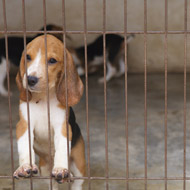
News welcomed by Cats Protection
Conclusions from a study into the welfare of dogs and cats involved in commercial practices have been published by the European Commission.
The conclusions suggest actions for Member States aimed at better enforcement and information to prospective owners. They also recognise the need for systematic requirements on identification and registration across the union.
Eurogroup for Animals, who were on the advisory board to the study, believe that such harmonisation is necessary to prevent the illegal trade in pets.
Elly Von Jessen, chair of Eurogroup’s Working Group on cat and dog welfare, said: “The conclusions of this study proves that the evidence provided by Eurogroup concerning the cruel, growing and illegal abuse of the Pet Travel Scheme, which poses serious threats to the health, welfare and safety of animals and humans alike has been recognised and we are pleased that the study calls for action to address this.”
She continued: “We hope that the Commission will now act responsibly and come up with an EU action plan to tackle this illegal trade, even if only for the veterinary public health risks that the illegal trade poses.”
The news has been welcomed by Cats Protection who have long been campaigning for improved identification and registration for cats in the EU.
“Whether a cat moves country legally or illegally, or even by accident after climbing into a vehicle, it is essential that the country of origin and the owner of the cat can be traced,” said Cats Protection’s chief executive Peter Hepburn.
“If microchipping databases in each member state are harmonised, we could reunite many more cats with their owners so we believe the European Commission’s recommendations are an important step forward for cat welfare.”
In February the European Parliament adopted a resolution calling on the European Commission to stop the illegal trade in pets.
In a show of hands, MEPs urged the commission to ensure all member states have compatible databases of cats and dogs, and to consider setting up databases for the pets too.
Commenting on the results of the study, Dr Renate Sommer MEP said: “The evidence of the illegal trade in pets, and the threats the trade poses is clear, whatever the results of this study.
"Whilst Member States can of course do more to inform pet owners and prospective owners on getting a new pet, and should take action to clamp down on poor breeding practices too, the faults inbuilt into the Pet Travel Scheme will not fix themselves.”
She continued: “Until the scope for uncertainly surrounding the stated age of a pet in its passport is mitigated, and until individual animals can be traced cross-border accurately, these animals will continue to be traded illegally, pose threats and will leave too many families heartbroken.
"Following the overwhelming support by the European Parliament, I now trust that the European Commission will start working on the delegated act to clamp down on these practices once and for all."



 The RCVS has announced a new version of its 1CPD mobile app, with enhanced features for veterinary surgeons and veterinary nurses to record their continuing professional development.
The RCVS has announced a new version of its 1CPD mobile app, with enhanced features for veterinary surgeons and veterinary nurses to record their continuing professional development.